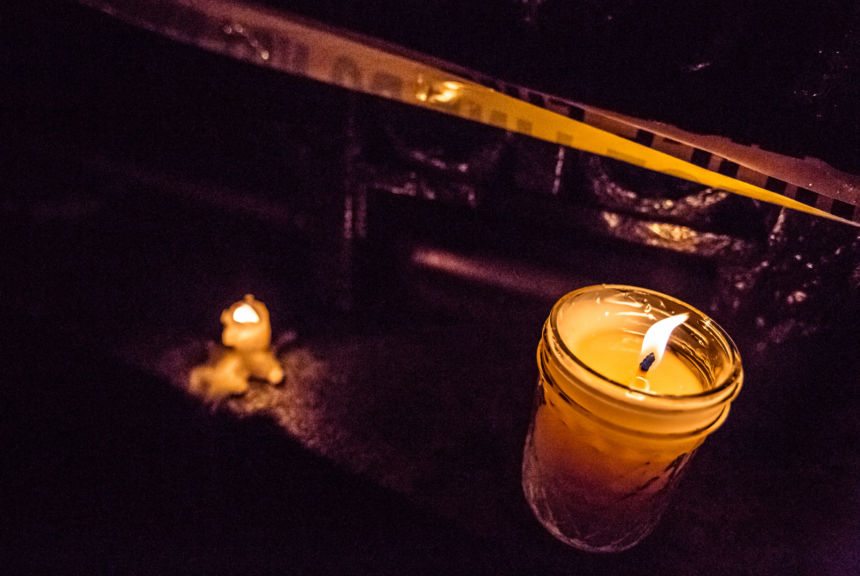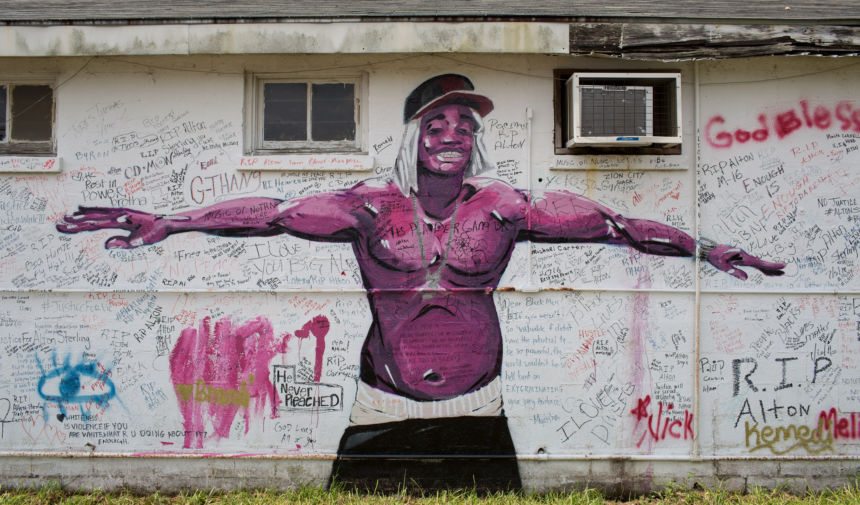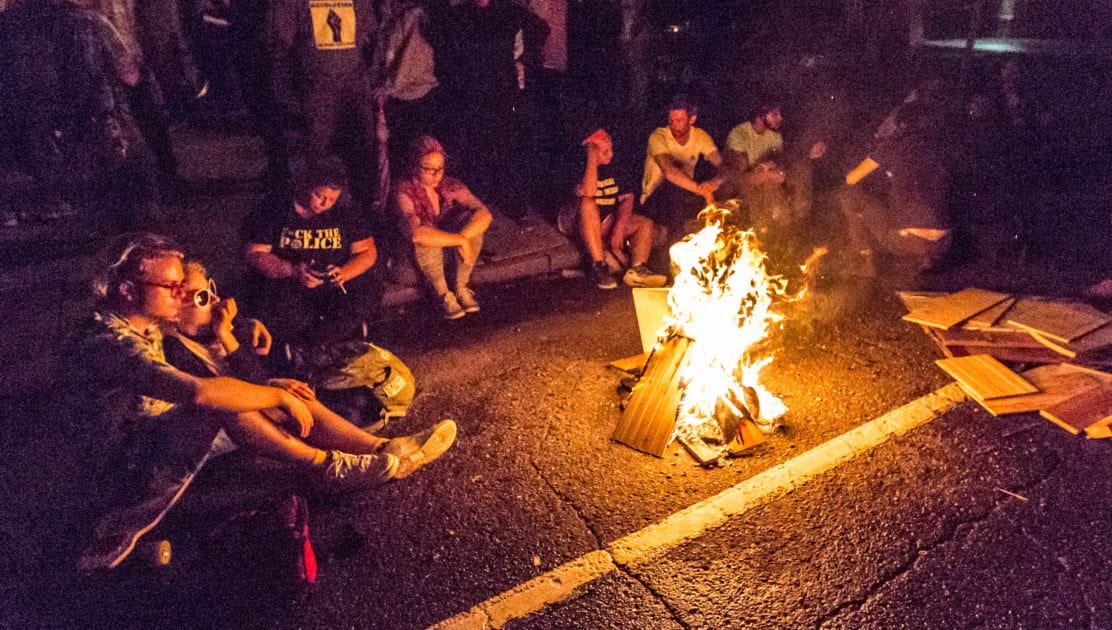Reflections on the Heat This Summer
A Contemplative Approach to Social Justice Work
By Rhonda V. MageeDespite a strong practice of meditation and reflection, I admit to struggling with my own sense of what to do and with how to be with the wide variety of spirit-killing realities that arose all around us, almost daily, this summer. The raft of shootings by police and then shootings of police. The nearly unfathomable tragedy in Nice. And, of course, the wars in the Middle East go on and children and their families suffer incredibly every day.
After watching the video of the killing of Alton Sterling in Baton Rouge, in early July, I intentionally delayed viewing the video of the well-publicized killing of Philando Castile in Minnesota. The pain and anguish of Mr. Castile’s companion and the stoicism of her little daughter—who has clearly seen far too much in her young life—haunt me now. They will haunt me for a long time.
There is no question that we need clear and present understanding of, as Marvin Gaye poignantly sang, “what’s going on.” We need to heighten and deepen our awareness of what lies at the root of these challenges to know how better to address them.
Which brings me to the Black Lives Matter movement. I believe that, at its heart, this is what the Black Lives Matter movement is about. It is a call for attending to the particular horror of the vulnerability of black and brown people. It calls on us to attend to violence perpetuated in the name of law enforcement—or law and order—and to the links between these actions and longstanding patterns of racism in America. It is a call for understanding of these patterns, understanding that is larger, deeper, and more profound than, say, even the most laudable efforts to change law enforcement practices through “training” and “programs” aimed at minimizing proven implicit and explicit bias.
We need to see this suffering, here and abroad, as part of a larger cry for deepening our commitment to loving responses to all who are vulnerable everywhere, and especially—though not exclusively—to those vulnerable to state-sponsored harm. We need to see them as a call for action aimed at ameliorating systemic, institutionalized harms to which we have gone “culture blind.”
To overcome blindness of any kind, we must regain the capacity to see. We must become more aware of the layers of experience and the dimensions of reality that comprise our lives and others’.

A candle and police tape from the scene where Philando Castile was shot and killed by police sits outside the Minnesota Governor’s mansion on July 7, 2016. Photo by Tony Webster from Flickr.
Mindfulness and compassion practices are profoundly beneficial in our efforts to see reality more clearly. And, fortunately, these practices work for all of us. Each of us has a role to play, however small, as there are no small efforts when our actions are motivated by a desire for justice.
Whatever the prescription I arrive at for myself, I know it will be more of what I have sought to do for some time: to deepen my own and others’ awareness of how ordinary, everyday practices, teachings, laws and policies can and often do dehumanize, separate, and, as MLK put it, stand against love. And then to take some small action to change things for the better.
Many of us have been speaking versions of the call for deeper understanding and more effective action for justice for many, many years. And now, so too is Michelle Alexander, author of the acclaimed The New Jim Crow: Mass Incarceration in the Age of Colorblindness. In a new essay, Professor Alexander writes:
We cannot “fix” the police without a revolution of values and radical change to the basic structure of our society. Of course important policy changes can and should be made to improve police practices. But if we’re serious about having peace officers—rather than a domestic military at war with its own people— we’re going to have to get honest with ourselves about who our democracy actually serves and protects.
Professor Alexander goes on to suggest that the revolution must be in the direction of a democracy that works for everyone.
Alexander may have been writing primarily to address the black community—a diverse community facing the brunt of the challenges we are all witnessing, and long in need of its (our) own shift in consciousness and reformation. But her comments bear reflection by us all. She’s calling for a revolution.
What does she mean? I can’t speak for her, but I believe she means a revolution of heart and mind. This is the revolution that a daily mindfulness practice may bring.
Before I begin my own reflections on all of this, before sorting through my own thoughts, I settle into a practice aimed at grounding myself in body and breath.
As I sense into my body and breath, I feel the support of the breath, and of the earth beneath me. I allow my awareness to encompass the physical and other comforts around me. I am aware that in this moment and place, my relative peace and desire for justice are each possible, in part, because of the particular combination of privileges and vulnerabilities associated with the identity markings that travel with me as I move through the world.
Academic and economic privileges flow from the credentials, status and experiences represented by letters that appear before and after my given name. Immigration/National Origin status privileges flow from my birth in the United States, as do privileges that flow from my cisgendered female, heterosexual appearance and performance in the world.
And yet, because I am black and female, intersecting experiences of pervasive vulnerability to degradation and violence (personal, institutional and systemic) are also a part of my everyday life. Every single day.
Because of the fact that some privileges protect me from the daily onslaught of physical degradations and vulnerabilities that arise from conditions of vulnerability, the revolution I’m called to join begins not from a place of desperation or despair. With my basic needs met, I am free in ways that others are not to attend to what ails my spirit.
For me, from here, the revolution I hope to usher into my life, and to support in the lives of others, begins within.
It begins within the heart, and with the embodied mind.
It begins with practice. In addition to simple sitting and lovingkindness meditations, lately I’ve been drawn to a meditation practice that allows me to connect with the people and places from which I draw strength each day. It is a meditation on the elements—earth, wind, fire and water—with a focus on how these elements run through each of us, and connect us with our past and present, our location in time and space, here and now, together with everything.
Can mindfulness and other awareness practices assist us in finding strength in our connections to people and place and ground during this time? Can community engaged practices enable us to find strength in our connections to one another—by holding hands, literally or figuratively, with our beloveds as we rise each new day, seek and find new reasons for hope?
I believe so. It has not been easy for me, but I can say that as I sit and practice, alone and with others, it works. It helps me bear the heat of this summer, and prepare for the winds of this fall, with a sense of the ground beneath me, and of my innate power to thrive and to flow within them.

Memorial Wall to Alton Sterling, photo by Maina Kiai from Flickr
To keep us grounded in the strength to do this work, it helps explicitly to keep working towards empathy and compassion. For example, it helps to remember that the particular aspects of suffering that seem most to reverberate through the heart will be different for each one of us. At the same time, we must actively care about each other’s suffering.
For me, the contemplative approach to social justice work is distinguished by the centrality of the heartful linking of inner and outer dimensions, so to speak, of our experience. It’s about the emphasis on active compassion.
Deep and abiding compassion arises from mindfulness practices that invoke a felt sense of the interconnectedness (interbeing or co-arising) that pervades all of the seemingly “separate” dimensions of our experiences and of related oppressions in the world. This includes, for many of us, the dimensions of race, gender/feminist, sex orientation, class/elitism, national origin/immigration status and so on. We sense—we know—that they are all profoundly interconnected.
Thus, while it is important to seek to deepen our understanding of the particular suffering of, say, black men, or of undocumented parents in American, it is also critical to understand the links, interconnections, and commonalities between them.
Ultimately, for me, all suffering may be driven into one—one experience of separation from grace, from the sense of our deep nature-beyond-name. My goal is to work to alleviate this sense of separation. Whether with contemplative teachers and scholars, with law students and lawyers, or with members of the black community in San Francisco who are working for change against the odds, I seek to alleviate the sense of separation, day after day, through contemplative practice.
I believe that we in the critical contemplative studies and social justice movement can do this. We can and do see and live our way into a deep and abiding sense that all of our separate struggles are truly interwoven. Yes, we will likely be drawn to separate projects. Yes, we will sometimes find it difficult to truly understand one another. Still, my hope is that the integrated sense of our commonality will never be far from view. And that, in that sense, we will each be allies of one another’s particular efforts to alleviate suffering in the world. We will sit, and then stand, together.
In the end, then, this is how I am living and thriving through the heat this summer. This is how I am surviving its emanations as the season inevitably turns to fall. I sit in community with others of like practice and mind. And this is my prayer for all of us: May we find strength in individual and community-based practices grounded in a view of our interconnectedness. May our contemplative commitments keep hope alive in each of us, and kindle the energy we need for a revolution of heart and mind, one that aims toward healing us each and all. Together.
Rhonda V. Magee is a Professor of Law and mindfulness teacher. She is the author of numerous articles and essays on teaching mindfulness for social justice, including “Teaching Mindfulness with Mindfulness of Diversity,” forthcoming in Resources for Teaching Mindfulness: A Cross-Cultural and International Handbook (Donald McCown and Diane Reibel and Marc S. Micozzi).
Top photo: Community members and Black Lives Matter activists gather outside the Minnesota Governor’s residence in Saint Paul, Minnesota, hours after the police shooting death of Philando Castile in Falcon Heights, Minnesota. July 7, 2016. Photo by Tony Webster from Flickr.

Pshew thank you for allowing me to think about social justice in another way and not get buried in the emotions of the all to frequent events
As I lament over the tragedies this week, I thank you for this thoughtful and timely piece. I will be sharing it with students and friends.
With Gratitude,
Doreen Collins-McHugh
Yes. Thank you. Inspiring, as always.